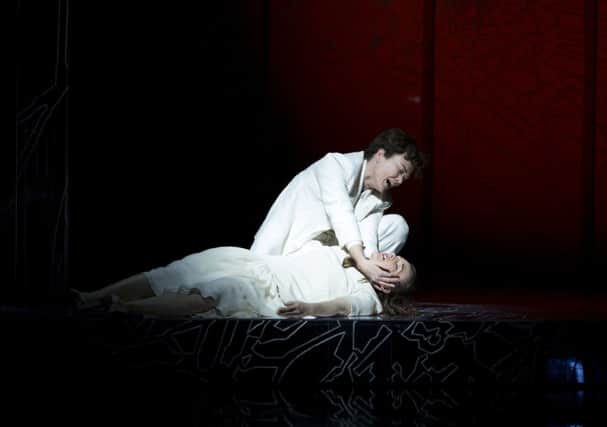Opera review: Orfeo Ed Euridice, Glasgow


Orfeo Ed Euridice
Theatre Royal, Glasgow
****
That is Page’s discipline, and its presence at the core of this colourful, beautiful and imaginative production is both intrinsic and vital.
Of course, this is the perfect opera for such treatment, Gluck having built in long tracts of ballet, mainly for its 1774 Paris rewrite. Many dance specialists have put their minds to creating imaginative solutions, but this one is strikingly original, self-confident and without compromise.
Advertisement
Hide AdPage cites the starting point for him and his designer, the late Johan Engels, as Cocteau’s 1950 film Orphée, which transports the classical tale to contemporary Paris. There are immediate clues: the neat and pretty New Look Dior dresses, including a Grace Kelly lookalike in Ana Quintans’ Amore; the loose white linen suit that identifies Caitlin Hulcup’s Orfeo; and the snake-like leather-clad, bug-eyed Furies, a sinister reinterpretation of Cocteau’s surreal motorcycling hit squad.
But the setting is unspecified. A huge revolving Perspex box dominates centre stage, a symbol of confinement and release. Around and within that, Page contrives a drama that shifts symmetrically from the blackened images of the opening funeral “party” for Euridice (Lucy Hall), to a concluding cork-popping welcome home “cocktail party”.
There are hints of the macabre, against which the central Elysian scene – all flowers, brightness and a sensual Dance of the Blessed Spirits – glistens with euphoric serenity. But the central fascination lies in the evocative symbiosis of dance and sung opera. This realisation is a delicious symphony of song and movement.
The small cast is evenly portrayed: Caitlin Hulcup’s Orfeo is sung with rich masculinity, Lucy Hall’s Euridice is pure and affectionate, and Ana Quintans radiates cool passion as the glamorous Amore. The chorus is best heard front stage, but fades in audibility when spread deep, possibly not helped by the very open orchestra pit.
The orchestra itself is fresh and alive under conductor Kenneth Montgomery’s authoritative direction. There are areas to refine – the corporate stability of the violin ensemble, perhaps – but this is Gluck played with tastefully restrained gusto and crisp, clean textures.
Page’s decision to create the interval break mid-Act 2 introduces an element of disproportion. But there’s logic in separating the depths of hell from the heights of Elysium. Like everything else in this production, sound thinking applied with good taste equals a memorable night at the opera.
Seen on 19.02.15
• Theatre Royal, Glasgow, tomorrow, 25 and 28 Feb, then at Edinburgh Festival Theatre from 3 March